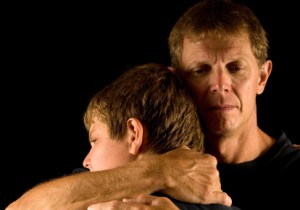|
|
July 12, 2010
 Things are going to different... better for all of us. Last week I stuck it to parents who, wittingly or un, permit bullying at home. If I weren’t such an uncompromising child advocate this might be where I apologize for offending. Sorry. No regrets about what I wrote. It was the truth. It was helpful. And it’s totally necessary for us to understand that love for our kids can’t ever be so blind that it keeps us from giving them a needed course correction.
For the record, more people read, tweeted and commented on that blog than anything I’ve cranked out in the past 2 years. Lots of thumbs up and to my knowledge, not a single parent bent out of shape. In fact one mom asked when I’d be serving my tips on “What to do if my kid is a bully?” Thanks for asking. I’m getting there.
Before I do I’ve gotta say I’m not keen on labels. There’s a huge difference between “My kid’s behavior is sometime/often aggressive, controlling and insensitive to the feelings of others” and “My kid’s a bully.” It may seem like PC BS semantics but it’s more than that. When you label a child you add a mantra to that kid’s internal monologue. Tell him he’s “bad,” tell her she’s a “bitch,” tell them they’re “worthless” and their young psyches start agreeing. Without meaning to you’re pushing them down the path you were trying to yank them off. You also provide them with excuses to continue misbehaving. “I can’t help it. I’m just a bad kid.”
So please don’t label your kid with “bully” or any other insult, even if (s)he’s acting that way.
Tips for changing bullying behavior.
1. Acknowledge the truth — When your child engages in behavior that’s meant to degrade or intimidate anyone (including you), see it for what it is. Name it. “My child is acting like a bully”.
2. Jump on it — Tell your kid exactly why what (s)he did is not OK. “Cruel’s not cool! Not at school. Not online. Not in this family. Not ever. Consider this a warning. The next time you talk to us that way, there will be a consequence.” And when “next time” happens follow up with the consequence. Don’t apologize. Don’t negotiate. And do not feel guilty! Threatening empty action is not only ineffective parenting, it also undermines your leadership and accountability. On top of that, it makes you look like a wimp in your child’s eyes. No way to earn the respect you say you want.
3. Get it on the record — At a family meeting discuss the ways each person shows respect and disrespect. Talk about a need for change in the direction of more respect & cooperation from everyone. Together create a set of agreements. The first one should be: In this family, we will always treat each other with respect. Parents and children are not equals in the family. Obviously we don’t share the same rights and privileges. But when it comes to following the Respect Rule, we are all equal.
Agree on consequences for not keeping the #1 rule. NOTE: Consequences need to matter to the child. “No TV” is meaningless if the kid’s got 10 other ways to entertain herself, including a laptop where she can download the show you told her she can’t watch.
4. Hold yourself accountable — Children repeatedly engage in unacceptable behavior (whining, cursing, silent treatment, hitting, door-slamming, screaming, non-cooperation, etc.) because parents let them get away with it and there is a payoff. If your son or daughter consistently acts like a bully at home, it is because you’ve allowed it. What you permit you promote.
NOTE: Hold yourself and your partner accountable for acting like a bully to each other and/or to the kids. Commit yourself to making changes in your own behavior.
5. Explore your typical response to your child’s most uncooperative behavior — If what you usually do hasn’t corrected the behavior yet, it’s not going to. If you need help regaining your leadership role in the family, read a parenting book, listen to a parenting podcast, take a parenting class, invest in a session with a licensed Marriage and Family Therapist or a Parenting Coach. In other words, if you need help, get it.
6. Be prepared for serious push-back — Kids who’ve been getting their own way for years are not suddenly going to become model team players just because you’ve gotten a backbone transplant. They will test to see if you mean business. Hang tough and show them you do.

July 2, 2010
 Me? A Bully? Yeah, right! This won’t be an easy read. But if the title pulled you in, you may already have some suspicions (or hard evidence) that your kid engages in mean-spirited behavior that hurts others. No parent wants to admit their kid is a bully, but according to a recent U.S. Department of Justice study, 77% of students nation-wide reported having been bullied, verbally, mentally or physically, in school in the past month. Lots of tormentors. Each one is somebody’s child. Would you know if (s)he was yours?
Hints that your child may be a bully:
1. You or your partner is a bully. The family is Ground Zero for learning about emotional responses and relationships. If a parent consistently yells or uses verbal threats, emotional blackmail or physical violence to manipulate family members, that’s what the child learns. And that learned aggression is likely to come to school with him/her. If you’re a bully it may be difficult for you to see it. If you’re wondering, ask your partner or your child “Do you think I’m a bully?” Hopefully they’re not too afraid to tell you the truth.
2. Your child is bossy at home. Is she demanding? Do things have to be her way or she throws a fit? Curses at you? Threatens? Gives you the silent treatment? Refuses to cooperate? Takes it out on siblings? If you made a short list of adjectives describing your child would you paint a portrait of someone you admire? If you admit she’s self-centered, controlling, insensitive at home, why assume she’s consistently caring and supportive at school?
3. Your child’s close friends are not the nicest people. You may not trust them without knowing why. Or you may have good reasons not to respect the choices these kids make. If so, talk to your child (calmly and respectfully) about these friends. This isn’t about labeling or demonizing. And it’s surely not about getting into a power struggle with your child about who she can and can’t be friends with. This is about understanding your child. Be compassionately curious about his friendships and he’s likely to open up. Your intent is to find out what your child likes about his friends and which ones, if any, your child may not be 100% comfortable with.
4. Your child makes rude comments about other kids. Tune in to conversations between your child and her friends. What kind of language do they use to describe other kids? How often do you overhear gossip, a rude put-down, or a “joke” being made at someone else’s expense?
Ask your child to tell you about the social hierarchy in her grade. Kids often like to display their expertise and you’ll be surprised at how detailed they get about who’s “in” and who is so not. Some kids will literally draw you a picture of the school’s social landscape! Listen closely as your child describes the kids who aren’t popular. Or the ones who are. Do you hear derogatory language? (“He’s such a loser.” “She’s such an ugly bitch.” “Fat!” “Retard!” “Whore.”) If your kid freely talks this way in your presence, there are no barriers to the hurtful words (s)he’ll say, text or post when you’re not around.
Parents of tweens and teens assume that their days of influencing their children are over. Not so! While it’s a fact that friends’ opinions are important, so are yours. You still have tremendous influence on your child’s values and behavior, and you always will. Even after your kids are grown with kids of their own.
If you are aware that your child is a bully or leaning in that direction, it’s up to you to provide a course correction. When each parent does their job… bullying problem solved.
Next week: What to do if you now realize that you’ve been contributing to a bully-in-the-making? How can you begin to help your son or daughter change… for good?

May 3, 2010
By Amy McCready
Parenting expert Amy McCready is the Founder of Positive Parenting Solutions. which offers free training resources. She created the celebrated Positive Parenting Solutions Online parenting course that empowers parents of toddlers to teens with the skills to correct misbehaviors permanently without nagging, reminding or yelling. Amy is a Positive Discipline Parent Educator and most importantly – a mom of two sons ages 12 and 14.
 Appreciate the moments of calm and you catch 'em in the act of doing something right Parents want to have close relationships with their children, but many wonder if that’s even possible as their once sweet, loving, cuddly child enters adolescence. Suddenly, your son is more interested in peers than spending time with the family, your daughter may be showing more rebellious behavior, and now, instead of being the one they turn to for advice, you don’t know a thing!
While scary for parents, the normal individualization process during the tween and teen years doesn’t have to involve power struggles and hard feelings if parents avoid these three common parenting mistakes:
1. Too much “ordering, correcting & directing”: No one wants to be bossed around and “ordering, correcting and directing” is a guaranteed way to get your tween or teen to shut down. Parents wouldn’t order, correct and direct friends or co-workers, yet many will bark orders in an attempt to demand compliance from kids. If we expect kids to respect parents, parents have to reciprocate with respectful communication.
Instead, use a calm voice and make respectful and reasonable requests. Ask yourself the question… “How would I feel if someone made this same request of me?” A calm and respectful approach doesn’t mean that kids aren’t held accountable for their behavior. Parents can hold kids accountable in a way that fosters a mutually respectful relationship and empowers kids to learn from their choices.
Instead of “ordering” – try “inviting cooperation”… “I’m slammed with work this evening. Anything you can do to help with the dinner clean up would really make a difference for me tonight.” Nine times out of ten – the teen will lend a hand!
2. Exerting too much control: Part of the normal development process for teens is to separate from us – but that invokes fear in most parents and they respond by “clamping down.” Instead of respecting the child’s need for greater autonomy – parents attempt to exert more control, which escalates power struggles.
Recognize your teen’s growing need for power and autonomy. Instead of “clamping down,” look for opportunities to give your teen MORE responsibility and decision making opportunities. Involve your teen in family decisions as appropriate.
Be reasonable with curfews and privileges. Demonstrate faith in your teen by giving a little more rope – but within your comfort zone. Be very clear about the responsibilities that accompany his or her privileges and be sure to reveal consequences in advance. That way your child will be perfectly clear about what will happen if he or she decides to test your limits. As the late parenting educator and author, H. Stephen Glenn said, “Children need enough rope to get rope burn, but not enough to hang themselves.”
3. Not being ON their team. Most teens feel that their parents are against them – not with them. When parents order, direct and correct too much, interrogate them about every little thing, or try to exert too much control – it invites power struggles and reinforces the feeling that we’re against them. When teens feel that parents are ON their team, they are more likely to communicate honestly and openly and may actually want to spend time with the family!
Show that you’re ON their team by getting into their world. Spend one-on-one time with them – on a daily basis – doing what THEY like to do. Parents often perceive that teens don’t want to spend time with parents – but they do! Taking 10 minutes, one or two times a day to talk, hang out, download music – or whatever your teen enjoys – increases your emotional connection and works wonders in keeping lines of communication open. It reinforces that you are “on her team” – not against her.

April 19, 2010
 Woah! I didn't know people could do that!
If you give a kid a computer, at some time or another, he’ll probably Google “Sex” or “Porn” or god knows what else. If you find out what he’s been looking at what do you do? What prepares a parent for this one? How do you discuss this with your child… or with another adult for that matter?
Recently a very brave and caring dad emailed me when he faced this challenge. Even if you’re beyond certain that your son/daughter would never check out an X rated site, read on anyway… :
Hello Annie,
I just discovered some pretty hardcore porn on my 12 year old son’s MP3/video player that I was trying to fix. I do not know how to handle this. I have not confronted him yet. I want to have a plan. I want to know where/who he got it from. He does spend time on My Space and he sometimes closes the door but mostly he is messaging as far as I can tell. I think he had to get it from someone else but that is not what bothers me. I am a more laid back dad but I feel I am too laid back. I want to dicipline him firmly and also start supervising his online activity. Any advice would be most appreciated.
Flabbergasted Dad
__________
Dear Dad,
It’s natural for a 12 year old boy to be curious about sex. There’s no point in getting angry with him for following his curiosity. That’s not to say pornography is appropriate material for him to be viewing. It isn’t! And that is a clear message he needs to hear from you.
You say you are “too laid back” which indicates that maybe you’ve never had a conversation with him about your rules for his internet use and other media consumption. Maybe you’ve never directly told him that pornography isn’t appropriate for 12 year olds. While you’re at it, you should definitely tell your son WHY you personally believe that is the case. He needs to know what your family values are when it comes to sexually explicit “entertainment.” And your expectations for his behavior on and offline when it comes to girls. Kids who think their parents “don’t care” what they do are often the ones who lack a strong sense of what is right. They are much more likely to be swayed by peer pressure.
So, take some slow deep breaths, then calmly and respectfully talk to your son. Tell him what you know about what he’s been doing. Tell him why this material is against your family values and make it clear that he is not to view it any more. Talk as openly as you can about sex and how exposure to pornography hurts kids by giving them a unhealthy perspective of adult relationships.
Even though your son knew intuitively that you wouldn’t be thrilled with what he was doing, don’t punish him. He didn’t know the rules. Now he will. Let him know that you will periodically and randomly be checking his computer and MP3 player to make sure that he is in compliance with your rules.
Fyi there are ways to turn on “parental controls” on most computers and MP3 players that will prevent the access of objectionable material. There are also ways to get around those safeguards, most easily “I’ll go to my friend’s house and view it there.” but then this becomes a trust issue. Bottom line: You want to trust your son and he wants to be trustworthy in your eyes.
I hope this helps.
In friendship,
Annie
__________
Hi Annie,
Thanks for the advice. I will talk to him tomorrow evening. I am glad I have taken the time to think more about how this can be a learning experience for both of us. I do need to talk more about our family values.
Thanks,
Dad
__________
Hi Dad,
You’re more than welcome. You might want to create an “objectives” list before your talk, ie., “What messages do I want my son to take away from our discussion in the short-term and for the rest of his life?”
Good luck with the conversation.
In friendship,
Annie
 — Older Posts »
| |















